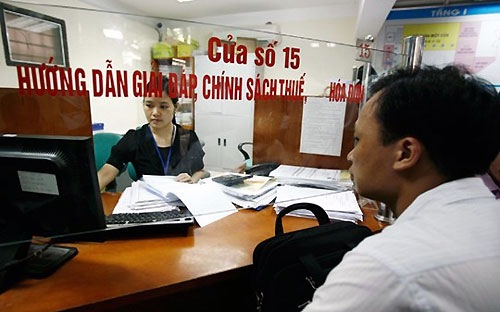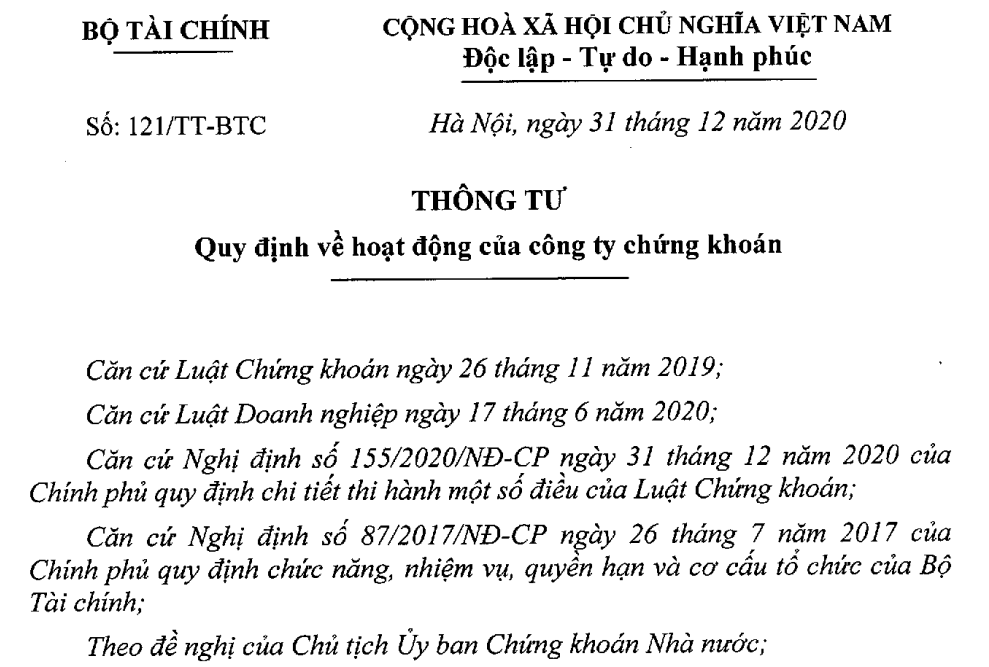Recently, the Ministry of Finance of Vietnam has just issued the Circular No. 121/TT-BTC prescribing operation of securities companies. According to this Circular, financial regulations of securities companies are one of the most important contents.

Specifically, financial regulations of securities companies are prescribed from Article 26 to Article 28 of the Circular No. 121/TT-BTC of the Ministry of Finance of Vietnam, including: restrictions on borrowing, restrictions on lending and restrictions on investment.
First, according to Article 26 of the Circular No. 121/TT-BTC of the Ministry of Finance of Vietnam, restrictions on borrowing are as following:
- Total liability of a securities company is not over 5 times more than its equity. Total liability prescribed herein does not include the followings:
+ Customers' funds held in trust for trading of stocks;
+ Reward and welfare fund;
+ Redundancy or lay-off provisions;
+ Provisions for compensation for investor’s losses.
- The maximum short-term liability of a securities company is equal to total short-term asset.
- Securities companies offering securities for sale shall comply with regulations laid down in Article 31 in the Law on Securities of Vietnam, the Decree elaborating on the implementation of several articles of the Law on Securities, laws on issuance of corporate securities, and must comply with the ratio prescribed in clause 1 and 2 of this Article.
In comparison with the previous provisions, according to Article 42 of the Circular No. 210/2012/TT-BTC (amended by the Circular No. 07/2016/TT-BTC), ratio of total debt to equity of securities company shall not exceed three (03) times. Therefore, up to now, the Ministry of Finance of Vietnam has increased the ratio of total debt to equity to not exceed 05 times.
Second, according to Article 27 of the Circular No. 121/TT-BTC of the Ministry of Finance of Vietnam, restrictions on lending are as following:
- Except as provided by clause 1 of Article 86 in the Law on Securities of Vietnam, securities companies are not allowed to lend money or securities in any form.
- Securities companies are not allowed to put up money or assets in their or customers’ ownership as security for third-party payment obligations.
- Securities companies are not allowed to offer loans in any form to owners, major shareholders, members of the Supervisory Boards, members of the Governing Boards, members of the Members' Councils, members of the Boards of Directors, Chief Accountants, other officeholders appointed by the Governing Boards and related persons of the aforesaid persons.
- Any securities company which is allowed to perform trades on margin in accordance with laws, can lend money to customers to buy securities in the form of margin trading under the guidance of the Ministry of Finance of Vietnam.
- Securities companies may lend securities to correct transaction errors, or perform swaps of exchange traded funds or other transactions in accordance with relevant laws.
Third, according to Article 28 of the Circular No. 121/TT-BTC of the Ministry of Finance of Vietnam, restrictions on investment are as following:
- Securities companies shall not be allowed to buy, contribute capital to buy real estate, unless they are not used as head offices, branches or transaction offices directly performing services or core business functions of securities companies.
- Securities companies can buy and invest in real property as prescribed in Clause 1 of this Article and fixed assets on condition that the residual value of fixed assets and real property does not exceed 50% of their total asset.
- Total investment in corporate bonds by a securities company does not exceed 70% of its equity. Securities companies obtaining licenses for the proprietary trading of securities may buy back listed bonds according to relevant regulations on bond repurchases.
- A securities company is not allowed to directly perform, or give trust to other entity or person to perform the following acts:
+ Holding stocks of or making capital contribution to any company owning more than 50% of the former’s charter capital, except in case of buying the odd lot of stocks upon the customer’s request;
+ Joining with related persons to own at least 5% of the charter capital of another securities company;
+ Holding over 20% of total number of outstanding shares or fund certificates of a listed entity;
+ Holding over 15% of total outstanding shares or fund certificates of an unlisted entity. This restriction shall not be applied to member fund certificates, exchange traded funds and open-ended funds;
+ Investing in or contributing to over 10% of total contributed capital of a limited liability company or business project;
+ Investing in or contributing to over 15% of total equity of a business entity or project;
+ Investing more than 70% of equity in stocks, share capital and business projects, including more than 20% of equity which is invested in unlisted stocks, share capital and business projects.
- Securities companies may establish or acquire fund management companies as their subsidiaries. In this case, securities companies are not required to comply with regulations laid down in point c, d and dd of clause 4 of this Article. Securities companies wishing to establish or acquire fund management companies as their subsidiaries must meet the following requirements:
a) The equity existing after contributing capital to establish or acquiring fund management companies as subsidiaries must be equal to the minimum charter capital required for parent companies’ current business activities;
b) The minimum liquidity ratio existing after contributing capital to establish or acquiring fund management companies as subsidiaries must be 180%;
c) After contributing capital to establish or acquiring fund management companies as subsidiaries, parent securities companies must obey restrictions on borrowing prescribed in Article 26 herein and restrictions on investment prescribed in clause 3 of this Article and point e of clause 4 of this Article
6. Where any securities company makes investments in excess of the prescribed limit due to its underwriting in the form of firm commitment, amalgamation, merger or any change in assets or equity of its own or capital contributors, it must take necessary actions to comply with the limits specified in Clause 2, 3 and 4 of this Article for a maximum period of 01 year.
The above are all financial regulations applicable to securities companies specified in the Circular No. 121/TT-BTC of the Ministry of Finance of Vietnam, replacing the Circular No. 210/2012/TT-BTC and Circular No. 07/2016/TT-BTC. Securities companies need to pay attention and update new regulations to comply with the law.
- Key word:
- Circular No. 121/TT-BTC
 Article table of contents
Article table of contents






.Medium.png)
.Medium.png)
.Medium.png)
.Medium.png)
